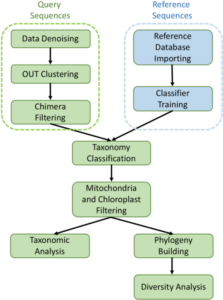Description
Material provided: data
Unit definition:
Library Preparation: Library Preparation: Nextera XT
24 million reads for 2×250 Paired End Length
Recommended Number of samples: up to 24 samples/run
Short Description:
Metagenomic is the characterization of microbial biodiversity that is present within a given sample. Metagenomic sequencing is a well-established method that allows the phylogeny and the taxonomy of samples from complex microbiomes or environments that are difficult or impossible to study like unculturable microorganisms by the sequencing of 16S ribosomal RNA.
Sequence variation in the prokaryotic 16S ribosomal DNA gene (16S rDNA) is widely used to characterize microbial communities. The v3-v4 regions of the 16S rRNA gene will be amplified and sequenced on an Illumina MiSeq instrument using 2×250 PE protocol.
A limited-cycle PCR reaction uses primers designed against the surrounding conserved regions of v3-v4 to amplify the insert DNA. The PCR reaction also adds index sequences on both ends of the DNA, thus enabling dual-indexed sequencing of pooled libraries on Illumina MiSeq instrument.
Raw sequencing data are processed to remove low quality reads, specifically reads with average Phred quality less than 20 over 30-bp window, contaminants and chimeras will be performed using Trimmomatic and and QIIME2 tools. Taxonomically profiling of samples resulting from OTUs (Operational Taxonomic Units) picking will performed using QIIME2 (97% identity for both sequence clustering and OTU centroid choice) aligning 16S sequences against SILVA non-redundant databases. The program QIIME2 or R packages (such as phyloseq) will be used to investigate the alpha and beta diversity of microbial communities.
The Experiment and the Product
The sequencing analysis service for Metagenomic Illumina sequencing of 16S rRNA with Bioinformatics analysis support (Ref-SKU: S.1.3.IT.149.42 & S.1.8.IT.149.46) based on the Nextera XT chemicals provided by Illumina includes the following for each sample:
- PCR Amplification of 16S rRNA hypervariable v3-v4 region
- Clean-Up of PCR amplicons
- Index PCR
- Clean Up of amplicon libraries
- Normalization and pooling
- MiSeq Sequencing
- Sequencing: 2 x 250 PE using MiSeq Reagent Kit v2
Bioinformatics analysis service includes the following for each sample:
- QC and pre-processing of raw data;
- Amplicon reconstruction, clustering and dereplication;
- Removal of chimera sequences;
- Taxonomic identification
- Alpha and Beta diversity analysis
OUPUT for the CUSTOMER Sample by Sample
- A Bar Graph for the microbiome composition
- OTU table
- Qiime2 visualization files and plot descriptive of alpha diversity indexes
- Qiime2 visualization files and plot descriptive of beta diversity indexes
The experiment and the product
End-user responsibilities
Biological material to be provided by the end-users and described in the dedicated request form.
– DNA INPUT RECOMMENDATIONS
Illumina library preparation protocol is followed by the service provider for preparing genomic DNA libraries.
The kit protocol is optimized for 12,5ng of input DNA total with absorbance ratio values of 1.8 – 2.0.
Minimal sample size to be provided 200ng of genomic DNA. Minimal volume: 10 ml/molecular grade water.
Recommended DNA Integrity Number (DIN) value: ≥ 7.
– REMARKS:
- If the provided sample doesn’t comply with the above requested specifications for “DNA INPUT RECOMMENDATIONS”, the customer will be contacted for a re-sampling.
- In case of failure of the sequencing run, the service will be repeated.
– DESPATCH OF SAMPLES
- Safe-lock 1.5 – 2 ml tubes properly capped to be used to avoid accidental evaporation or sample contamination during shipping.
- Samples to be labelled correctly
- Correct temperature must be ensured during the shipment to avoid sample degradation.
- Complete the enclosed Sample Submission form and return together with the samples to: orders@pologgb.com.
Supplier responsibilities
– STORAGE OF BIOLOGICAL SAMPLE
Polo d’Innovazione Genomica Genetica Biologia will store the analysed samples only for 1 month after delivery. Extended storage time is available for a maximum of 4 months and must be requested in advance of the experiments in the service request application.
– STORAGE OF DATA
Polo d’Innovazione Genomica Genetica Biologia waives any responsibility for the storage and backup of the supplied project and sequencing data after delivery to the end-user. Polo d’Innovazione Genomica Genetica Biologia will store the project data only for 1 month after delivery. After expiration of this period, all data are removed from our servers and archived (unless otherwise agreed with the end-user). Your data might be re-imported at an extra cost within the period of 1 year after delivery of the final data. After 1 year, all project data will be deleted permanently from our systems. Extended data storage is available on request at an extra cost and must be requested at project start.
– DELIVERY OF RESULTS
The sequencing and bioinformatics results will be sent according to the Modalities of Transfer with a QC Library & Bioinformatic Reports PDF Files. The bioinformatic analysis will be executed in 40 working days from the generated sequencing data.
Modalities of transfer:
- by “WeTransfer” platform to email for data of up to 2Gb
- by “MegaSync” platform for data ranging from 2Gb to 15Gb
- by HD for data over 15 Gb
Please note that the cost of HD driver is not included. Where requested, the end-user must provide the HD.
For further details on the description of the experiment please consult the “16s-metagenomic sequencing library preparation”.
References:
For more information, please contact us.
For technical assistance, contact Polo GGB Technical Support:
Email: techsupport@pologgb.com
Telephone: 0039 0577 381310


